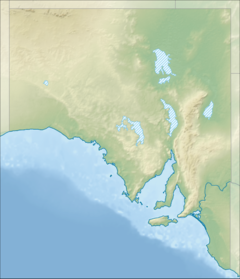| Crystal | |
|---|---|
Location of the river mouth in South Australia | |
| Location | |
| Country | Australia |
| State | South Australia |
| Region | Mid North |
| Physical characteristics | |
| Source | Mount Zion |
| • location | Wirrabara Forest |
| • elevation | 367 m (1,204 ft) |
| Mouth | confluence with the Broughton River |
• location | west of Crystal Brook |
• coordinates | 33°21′S138°06′E / 33.350°S 138.100°E |
• elevation | 46 m (151 ft) |
| Length | 41 km (25 mi) |
| Basin features | |
| River system | Broughton River |
| Waterhole | Beetaloo Reservoir |
| [1] | |
The Crystal Brook is an ephemeral stream in the Mid North region of the Australian state of South Australia.
